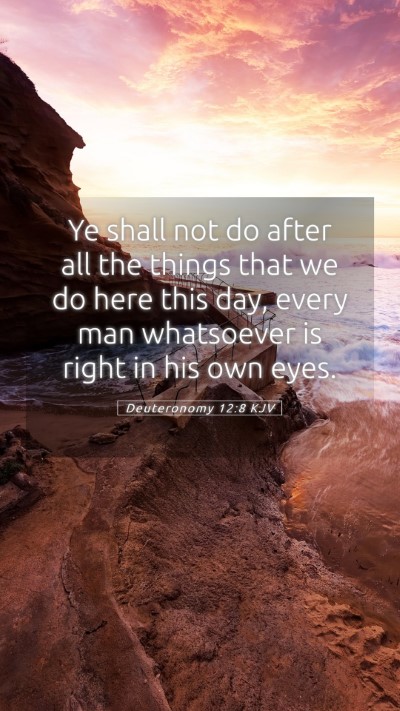Understanding Deuteronomy 12:8
Bible Verse: Deuteronomy 12:8 - "You shall not do according to all that we are doing here today, every man doing whatever is right in his own eyes."
Summary of Meaning
This verse addresses the importance of adhering to God's prescribed methods of worship and living, in contrast to the chaotic and individualistic practices that the Israelites were exhibiting at the time. The passage stresses the necessity of collective obedience to God's law rather than personal whims.
Scripture Analysis
The verse reflects a contrast between the prescribed worship of God compared to the varied personal interpretations that people might devise. It serves as a warning against spiritual anarchy and the perils of subjective morality.
Insights from Public Domain Commentaries
Matthew Henry's Commentary
Matthew Henry emphasizes the danger of individuals doing what seems right to themselves, pointing out that it leads to a departure from God's ordinances. He notes that such behavior not only jeopardizes personal relationships with God but also undermines community worship. The implications are that a godly structure is essential for proper worship, which requires adherence and submission to divine instructions.
Albert Barnes' Notes
Albert Barnes discusses the context of this commandment, indicating that the Israelites were surrounded by other nations who worshipped in a disorderly manner. Barnes points out that God's people are called to a different standard—one that is outlined explicitly in the law. This verse serves to remind the Israelites that their worship should not reflect the customs of those around them but rather should be directed by God’s commandments.
Adam Clarke's Commentary
Adam Clarke elaborates on the societal implications of doing what is right in one's own eyes. He argues that when each person decides their own moral and spiritual path, it leads to confusion and disorder. Clarke emphasizes the necessity of unity among God's people and stresses that moral ambiguity can lead to societal decay. The passage serves as a call for the Israelites to seek a unified understanding and interpretation of God’s commands.
Key Themes
- Obedience to God's Commandments: Emphasizes collective adherence to God’s law.
- Dangers of Individualism: Warns against subjective morality; leads to chaos.
- Call for Unity: Urges the people to seek a common understanding of their faith and practices.
Cross References
- Proverbs 14:12 - "There is a way that seems right to a man, but its end is the way to death."
- Judges 17:6 - "In those days there was no king in Israel; everyone did what was right in his own eyes."
- Romans 12:2 - "Do not be conformed to this world, but be transformed by the renewal of your mind."
Conclusion
Deuteronomy 12:8 serves as a profound reminder of the significance of understanding Scripture within its appropriate context. The insights offered by historical commentaries shed light on the implications of the verse for both individual believers and the collective community of faith. This examination not only facilitates a deeper engagement with the Biblical text but also guides believers in applying these truths to their daily lives, fostering a community united in obedience to God’s will.
Application and Reflection
As you delve into your Bible study, consider how the themes from Deuteronomy 12:8 apply to contemporary society. Engage in discussions with your Bible study groups about the relevance of this verse and how it shapes personal and communal worship practices.


